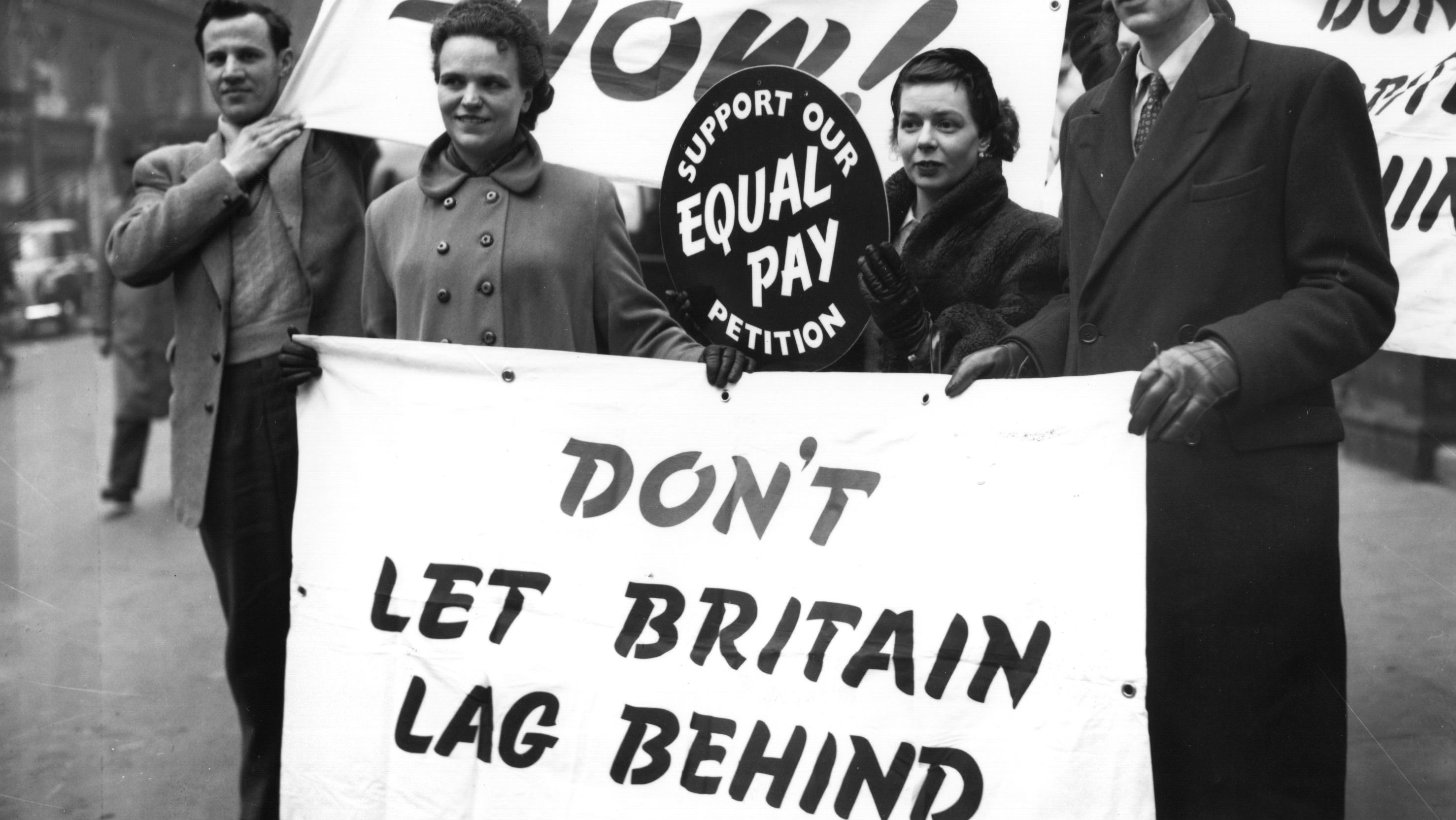Women paid £85,000 less than men during their 50s
TUC calls for more help for working mothers after figures show gender pay gap peaks in the decades after childbirth

A free daily email with the biggest news stories of the day – and the best features from TheWeek.com
You are now subscribed
Your newsletter sign-up was successful
Women earn on average £85,000 less than men during the decade after they turn 50, says the Daily Telegraph.
According to an analysis of Office for National Statistics figures by unions group the TUC, that's the age range in which the gender pay gap in the UK is at its peak, at an average of £8,503 a year.
Many experts believe women earn less because they take more time out to start a family and bring up their children, with many leaving their jobs altogether and returning only in lower-paying, part-time roles.
The Week
Escape your echo chamber. Get the facts behind the news, plus analysis from multiple perspectives.

Sign up for The Week's Free Newsletters
From our morning news briefing to a weekly Good News Newsletter, get the best of The Week delivered directly to your inbox.
From our morning news briefing to a weekly Good News Newsletter, get the best of The Week delivered directly to your inbox.
But that does not take account of the fact there is an observable pay gap "as soon as women start working", says The Guardian, with 18 to 21-year-olds earning on average £1,395 less than their male counterparts.
The disparity accelerates as women get older, with a big jump in particular at the age of 40 when it more than doubles, rising from £3,034 to £7,234.
There is evidence to suggest the widening of the pay differential at these ages is directly related to parenthood, says the Guardian.
"At the age of 42 – the midpoint of a typical working life – the pay gap between mums and dads in full-time work was 42 per cent," the paper says. "For childless men and women, it was 12 per cent."
A free daily email with the biggest news stories of the day – and the best features from TheWeek.com
Overall the gender pay gap has been coming down, but at a slower rate in recent years. Women are paid on average 9.4 per cent less than men, with the shortfall starting out at nine per cent, peaking at 25 per cent between the ages of 50 and 59, and then dipping slightly to 23 per cent.
Frances O'Grady, the TUC general secretary, said: "Far more needs to be done to help mums get back into decent, well-paid jobs after they have kids – and to encourage dads to take on their share of caring responsibilities."
Civil service gender pay gap widens
7 October
Progress on closing the gender pay gap appears to have bypassed the civil service, reports The Guardian.
While the disparity between the average pay for men and women has been slowly receding nationally, hitting 9.4 per cent last year, newly-released figures show it has widened for government workers.
For the year to March, women in the civil service were paid on average 13.6 per cent less than men, compared to a gap of 12 per cent the year before.
This was due to the difference in wage rates for those on full-time contracts increasing to 12 per cent, from nine per cent. For part-time workers it declined from 15.4 per cent to 11.5 per cent.
Most experts argue there are few remaining instances of outright unequal pay for the same work in Britain, but say that the stubborn wage differential is the result of contrasting career paths between the sexes.
In particular, women tend to take the primary role in childcare. This means many more put their careers on hold, sometimes for years at a time, to have a family – and many continue to work part-time for an extended period.
The effect of this is that fewer women make it into executive roles – or it takes them longer to get there.
In the civil service the latest figures show women outnumber men on average, but they make up a smaller proportion of the top-paying ranks.
Others argue the problem still exposes outright, if often insidious, discrimination. A recent Deloitte study, for example, found that in all but one of the ten most popular occupations for graduates men start on higher salaries.
Others argue that resistance to flexible working, poor pay for jobs that are female-dominated, and the assumption that women will take on childcare responsibilities are examples of unequal treatment.
"Equal pay and discrimination are the only legally actionable contributors to the gender pay gap, but the reality is that they are only minor contributing factors," says Nick Cartwright on The Huffington Post.
"Progression, the devaluing of what is seen as 'women's work', labour market segregation, part-time and casualised contracts, and issues with work life balance are much bigger factors."
Gender pay gap 'won't be closed until 2069'
26 September
It will take until 2069 for women to earn the same as men if the current rate of closing the gender pay gap is maintained, researchers say.
A report from law firm Deloitte claims that at 9.4 per cent, the discrepancy in earnings is smaller than it has ever been.
However, progress is slow – the gap is closing by just 2.5p per year while in some occupations, "such as skilled trades and education, it is actually widening".
At this rate, it will take another 53 years to end gender pay disparity - 99 years after the UK passed the Equal Pay Act.
Deloitte says it is "too simplistic to explain the gender pay gap in terms of pay inequality", Sky News reports.
"Complex factors" that feed into unequal earnings include "women being more likely to take jobs where pay is relatively low, such as in care; women taking time out for family reasons; and women taking more poorly paid part-time jobs when they return", adds The Guardian.
There does appear to be evidence of straightforward discrimination in starting salaries for graduates, however.
"In all but one of 10 popular occupations for graduates, men start out on higher average salaries than women. In all 10, the gap widens over time," says the Guardian.
For Deloitte, the key area for policymakers to address is encouraging women into jobs based around science, technology, engineering and mathematics, where the average salary gap is smallest but where the proportion of female workers is also most meagre, at just 14 per cent.
This stems from choices made at school, says the report, with three times more boys opting to study computing at GCSE level and 50 per cent more studying design and technology.
Helen Byrne, a mathematical biologist at the University of Oxford, told the BBC it was important for women to have female role models in such professions.
She added: "How can you use your maths, physics, chemistry, different disciplines, what does that look like? What I do isn't what I imagined a mathematician did when I was at school. It's much more fun."
A government spokeswoman said: "The gender pay gap is the lowest on record but we are committed to eliminating it completely in a generation.
"We are continuing to encourage more girls to study these subjects and last year, 12,500 more girls sat A-Levels in [science, technology, engineering and mathematics] subjects compared to 2010."
-
 The environmental cost of GLP-1s
The environmental cost of GLP-1sThe explainer Producing the drugs is a dirty process
-
 Greenland’s capital becomes ground zero for the country’s diplomatic straits
Greenland’s capital becomes ground zero for the country’s diplomatic straitsIN THE SPOTLIGHT A flurry of new consular activity in Nuuk shows how important Greenland has become to Europeans’ anxiety about American imperialism
-
 ‘This is something that happens all too often’
‘This is something that happens all too often’Instant Opinion Opinion, comment and editorials of the day
-
 The pros and cons of a four-day working week
The pros and cons of a four-day working weekPros and Cons Think-tank says shift in working patterns could help alleviate the cost-of-living crisis
-
 Labour shortages: the ‘most urgent problem’ facing the UK economy right now
Labour shortages: the ‘most urgent problem’ facing the UK economy right nowSpeed Read Britain is currently in the grip of an ‘employment crisis’
-
 Will the energy war hurt Europe more than Russia?
Will the energy war hurt Europe more than Russia?Speed Read European Commission proposes a total ban on Russian oil
-
 Will Elon Musk manage to take over Twitter?
Will Elon Musk manage to take over Twitter?Speed Read The world’s richest man has launched a hostile takeover bid worth $43bn
-
 Shoppers urged not to buy into dodgy Black Friday deals
Shoppers urged not to buy into dodgy Black Friday dealsSpeed Read Consumer watchdog says better prices can be had on most of the so-called bargain offers
-
 Ryanair: readying for departure from London
Ryanair: readying for departure from LondonSpeed Read Plans to delist Ryanair from the London Stock Exchange could spell ‘another blow’ to the ‘dwindling’ London market
-
 Out of fashion: Asos ‘curse’ has struck again
Out of fashion: Asos ‘curse’ has struck againSpeed Read Share price tumbles following the departure of CEO Nick Beighton
-
 Universal Music’s blockbuster listing: don’t stop me now…
Universal Music’s blockbuster listing: don’t stop me now…Speed Read Investors are betting heavily that the ‘boom in music streaming’, which has transformed Universal’s fortunes, ‘still has a long way to go’